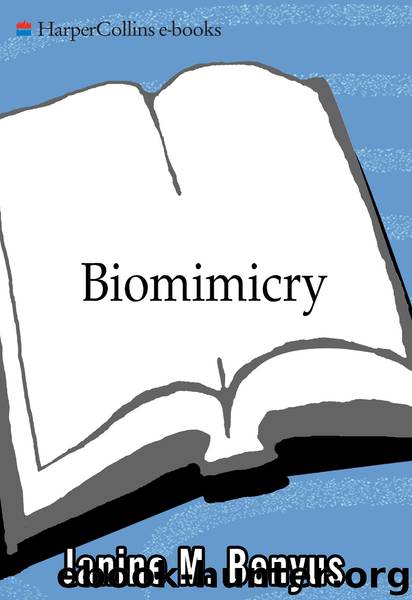Biomimicry by Janine M. Benyus

Author:Janine M. Benyus
Language: eng
Format: epub
Publisher: HarperCollins
Published: 2009-04-13T04:00:00+00:00
Even this flexible hardwiring can’t fully explain the fine discrimination shown by animals, however. Regardless of how plant-smart their inborn sensors are, nothing could prepare an animal to automatically recognize every species in the jungle. Some things just have to be learned on the job.
With primates (and many other animals, such as elephants), the learning begins with Mom. Infants will peer and poke into their mother’s mouth to smell and taste what she is eating, and after a while, they build a chemical profile of what’s good. “It’s like downloading information from a computer,” says Glander.
Once they leave their mother, primates have to keep on making decisions about whether new foods they encounter are safe and worth collecting. Using themselves as guinea pigs is one option, but social primates have found a better way. Kenneth Glander calls it “sampling.” When howler monkeys move into a new habitat, one member of the troop will go to a tree, eat a few leaves, then wait a day. If the plant harbors a particularly strong toxin, the sampler’s system will try to break it down, usually making the monkey sick in the process. “I’ve seen this happen,” says Glander. “The other members of the troop are watching with great interest—if the animal gets sick, no other animal will go into that tree. There’s a cue being given—a social cue.” By the same token, if the sampler feels fine, it will reenter the tree in a few days, eat a little more, then wait again, building up to a large dose slowly. Finally, if the monkey remains healthy, the other members figure this is OK, and they adopt the new food.
Not all monkeys volunteer for sampling duty, however. Glander has noticed that monkeys in vulnerable stages of their lives—juveniles, subadults, and lactating or pregnant females—seem to bow out of sampling. If the risks are too great for some monkeys, why would any monkey volunteer? “I think the benefits may be genetic,” says Glander. Adult monkey fathers, for example, may be boosting the health of their offspring by testing foods for their pregnant or lactating mates. Adults that aren’t yet parents may also volunteer, pointing out wholesome foods for their siblings and nieces and nephews who share a portion of their genes. Despite these benefits, Glander says no monkey would want to risk being a full-time sampler. “The sampler role shifts from monkey to monkey, so as to spread the risk and not unduly jeopardize anyone. This risk-sharing is, in itself, a good reason for being social,” speculates Glander. Sampling, he believes, may have in fact contributed to the development of social behavior in primates.
Besides tipping the scales toward sociability, tricky food choices may also have challenged animals in ways that rewarded intelligence. Researchers hypothesize that sometime in the Middle Miocene (7 to 26 million years ago), monkeys developed the ability to tolerate higher levels of toxins than apes could, giving monkeys a wider choice of foods. Apes (our ancestors) were stuck with a more
Download
This site does not store any files on its server. We only index and link to content provided by other sites. Please contact the content providers to delete copyright contents if any and email us, we'll remove relevant links or contents immediately.
Sapiens: A Brief History of Humankind by Yuval Noah Harari(13053)
The Tidewater Tales by John Barth(12030)
Do No Harm Stories of Life, Death and Brain Surgery by Henry Marsh(6336)
Mastermind: How to Think Like Sherlock Holmes by Maria Konnikova(6236)
The Thirst by Nesbo Jo(5785)
Why We Sleep: Unlocking the Power of Sleep and Dreams by Matthew Walker(5642)
Sapiens by Yuval Noah Harari(4537)
Life 3.0: Being Human in the Age of Artificial Intelligence by Tegmark Max(4508)
The Longevity Diet by Valter Longo(4445)
The Rules Do Not Apply by Ariel Levy(3906)
The Immortal Life of Henrietta Lacks by Rebecca Skloot(3826)
The Body: A Guide for Occupants by Bill Bryson(3802)
Why We Sleep by Matthew Walker(3773)
Animal Frequency by Melissa Alvarez(3755)
Yoga Anatomy by Kaminoff Leslie(3701)
Barron's AP Biology by Goldberg M.S. Deborah T(3632)
The Hacking of the American Mind by Robert H. Lustig(3580)
All Creatures Great and Small by James Herriot(3516)
Yoga Anatomy by Leslie Kaminoff & Amy Matthews(3396)
